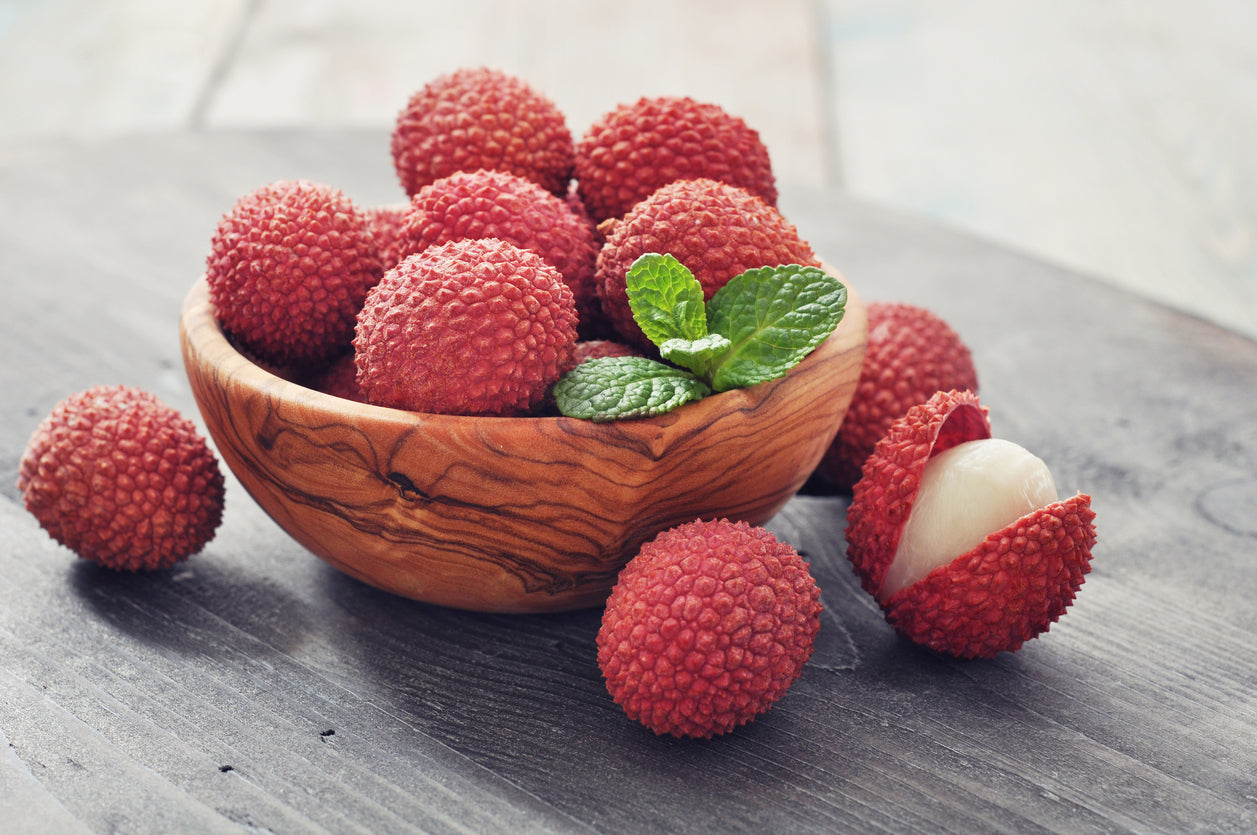Discover the “royal” health benefits of lychees

There is no shortage of names to pick from when it comes to labels for the delicious fruit known as the lychee. Sometimes called litchi nut or lichee nut (although it is not, botanically speaking, a nut), lychee fruit is also known by the nicknames “alligator strawberry” and “Chinese cherry.” On one fact, however, everyone seems to agree - lychee fruit originates from the Litchi chinensis tree, an evergreen in the soapberry family.
Long popular in Asian cuisine, lychee is gaining traction in the United States for its appealing flavor and considerable health benefits. By the way, when you enjoy a lychee, you’re eating a delicacy straight from the menu of ancient royals. Food historians report that the lychee was customarily served in the fourteenth-century Chinese Imperial Court! (How’s that for “fancy?!”)
Let’s see why lychee has long been considered fare “fit for a king” – and how it can support and enhance our modern-day health and well-being.
Lychees are at the “top of the food chain” when it comes to antioxidants
Lychee fruit is extremely rich in antioxidant polyphenols, which can neutralize the harmful free radicals that contribute to oxidative stress and damage. In fact, in a study published in the Journal of Nutrition, researchers reported that lychees - along with strawberries and grapes - had the highest concentration of antioxidant polyphenols of all fruits studied. There was some tough competition - lychee fruit beat out both avocados and cantaloupe in antioxidant capacity! Specific antioxidant plant compounds in lychee include rutin, quercetin, epicatechins (the same beneficial flavonoids found in green tea), and proanthocyanidins, the anti-inflammatory plant pigments that contribute to the healthful qualities of purple grapes and blueberries.
In addition, lychee fruit is rich in vitamin C - a powerful antioxidant in its own right - with a 3.5-ounce serving containing close to 100 percent of the adult daily recommended amount. So there’s no doubt: if you’re looking to increase your intake of antioxidants, lychee is a great choice.
Lychee supports a healthy heart
Lychee fruit has all the “right stuff” to help keep your heart ticking happily along. First of all, lychee contains potassium, an essential mineral that helps to regulate blood pressure. It also offers vitamin B3 (niacin), vitamin B6, and vitamin B9 (folate). Niacin has been linked in studies to increases in healthy HDL cholesterol, while vitamin B6 and vitamin B9 may help manage homocysteine levels, an amino acid considered pro-inflammatory when present in excessive amounts.
Lychee fruit may also promote heart health by contributing dietary fiber, which helps to maintain desirable cholesterol levels. Finally, antioxidant and anti-inflammatory compounds in lychee fruit may help maintain an efficient heart muscle, healthy arteries, and a well-functioning circulatory system. So when it comes to weighing options for a heart-healthy diet, lychee should get a definite “yes.”
Lychee in moderation may help support your weight-loss journey
When it comes to providing a nutritious, refreshing, and relatively low-calorie snack, lychee fruit goes to the head of the class. With over a gram of fiber in every 3-ounce serving, lychee helps provide a sense of fullness and satisfaction that may reduce food cravings and binge eating.
In addition, the natural sugars in lychee also may help satisfy a sweet tooth without resorting to processed candies and refined sugars. And, it doesn’t hurt that a 100-gram serving contains only a modest 66 calories. (This is less than that of an average orange, by the way.) Of course, lychee fruit is high in carbs – so common sense and moderate servings should prevail.
Consisting of 82 percent water, lychee fruit can support proper hydration. This makes lychee an excellent pre-or post-workout snack. (In fact, some studies even suggest that lychee fruit can enhance athletic performance). In addition, anti-inflammatory constituents in lychee may also help ease routine post-exercise muscle soreness. So it just might be a good move to invite lychee fruit to your next workout!
Lychees add a burst of flavor to salads and smoothies
Combine fresh lychees with pineapple, mangoes, shredded coconut, and papayas for a stunning tropical fruit salad. Or, use them to top oatmeal, yogurt, or waffles. You can also juice lychee fruits and add them to spritzes and coolers or whirl them in a blender to elevate your favorite smoothie. (Pro tip: the flowery taste of lychee pairs perfectly with the tarter flavors of ginger and lime). You can also incorporate lychees into seafood, poultry, and beef recipes or freeze them with a bit of honey for a bright, palate-cleansing lychee sorbet.
As lychees don’t ripen after they are picked, it’s important to select properly ripened fruit. Look for firm, bright red skin that “gives” a little when squeezed. Good news for impatient people: the leathery skin of the lychee is easy to pierce with a thumbnail, making it simple to “un-zip” the goodness inside. After peeling and discarding the skin and central seed, lychees are ready to be enjoyed.
Don’t stress too much if you can’t find fresh lychee. Nutritionally speaking, the canned variety is an acceptable substitute. But, do try to avoid lychees packaged in sugary syrup.
Eat lychees in moderation, and - if you are on prescription medications - check with your integrative physician before trying lychee fruit.
With a winning taste, and the ability to support “head-to-toe” health, the lychee fruit is an excellent addition to a healthy diet. And, you don’t have to be “royalty” to enjoy it.
Sources for this article include:
-
Posted in
antioxidants, benefits of lychees, healthy diet, lychee fruit, tropical fruits






